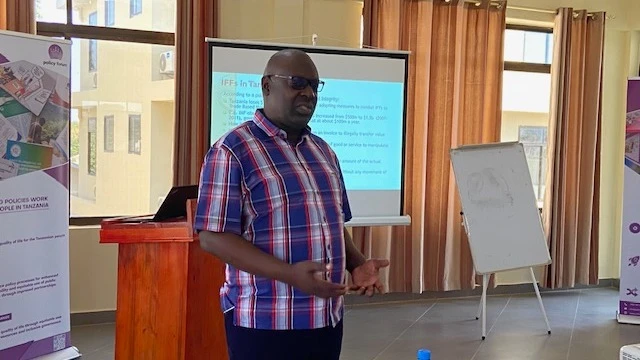Unlocking Tanzania’s economic potential: Need to balance growth and tax justice in SEZs, EPZs

SPECIAL Economic Zones (SEZs) and Economic Processing Zones (EPZs) have been cited as important economic development tools for countries to attract foreign investments. And if well utilised they are likely to boost the nation’s economy to higher heights.
According to Associate Professor of Development Economics at the University of Dar es Salaam, Prof Abel Kinyondo, the government of created EPZs and SEZs whereas the focus of SEZs was investment promotion in specific industries and EPZs focusing on promoting exports.
The general objectives for establishing SEZs were to promote economic growth and boost export earnings, create employment as well as attract investments both foreign (FDI) and domestic (DDI) from productive and service sectors consistent with Tanzania’s Vision 2020 aimed at transforming Tanzania into a globally competitive economy (EPZA 2016).
Prof Kinyondo said EPZs were established a little earlier in 2002 following the enactment of Export Processing Zones Act of 2002 with the aim of increasing Tanzania’s global competitiveness for export-led economic growth through promoting technological transfer, export-led industrialization, foreign exchange earnings, development of skilled labour and employment creation.
He was speaking during a recent five-day journalists training organized by Policy Forum in Dodoma. The main objective of the training was to empower journalists with reporting skills on illicit financial flows (IFFs), domestic resource mobilization (DRM), accountability and tax justice.
Linkages between the local economy and the international market, and promoting value addition through processing of local raw materials for export was yet another reason for the establishment of EPZA—a special economic zone designated area that is subject to unique economic regulations that differ from other areas.
SEZs, EPZs, can significantly impact tax justice, particularly in Tanzania, through their intended goals and effects on local economies.
In Tanzania, the relationship between SEZs, EPZs and tax justice is complex. While these zones can drive economic growth and development, their design and implementation must be carefully managed to ensure they contribute positively to the economy and do not exacerbate inequality or undermine the tax base.
Prof Kinyondo defines tax justice as the set of ideas, policies, and advocacy efforts aimed at achieving equality and social justice through fair taxation on wealthier individuals and multinational corporations. According to the Tax Justice Network, tax justice often targets tax havens, while seeking to curtail corruption and tax abuse by multinational corporations and the super-rich.
These tax havens offer significant tax breaks, which, while stimulating economic activity, can reduce government revenue, impacting public services. The benefits of these tax incentives are not always distributed equitably, with large corporations often reaping disproportionate rewards compared to local businesses or communities.
Under the Tanzania's Export Processing Zones Act, goods processed and manufactured within EPZ-designated areas are exempt from import duties on raw materials. Similarly, factories registered under ‘manufacture under bond’ schemes for export purposes are exempt from import duties and other taxes on inputs.
However, the presence of large foreign firms in these zones can overshadow local businesses, potentially fostering monopolistic practices and stifling local entrepreneurship.
Reduced regulatory oversight in these zones can lead to exploitative practices such as tax evasion and labour rights violations. Lenient regulations may open the door to corruption, undermining the principles of tax justice.
Over-reliance on tax incentives can also create unsustainable economic models, where growth is dependent on continued incentives.
To achieve tax justice, balanced policies are necessary. There needs to be a balance between encouraging investment and ensuring fair taxation and equitable economic growth. Tax justice experts have suggested that Tanzania should implement more transparent tax policies and establish clearer regulations for SEZs (Special Economic Zones) and EPZs. Transparent and consistent tax regulations would minimize ambiguity and ensure compliance.
The government should require companies operating in these zones to publicly disclose their financial statements and tax contributions. Tax incentives should be designed to specifically benefit local businesses and SMEs, rather than disproportionately favouring large foreign corporations.
Strengthening regulatory frameworks by enhancing oversight in SEZs and EPZs could help prevent tax evasion, corruption, and labour exploitation.
Prof Kinyondo also pointed out that despite Tanzania's relatively comprehensive fiscal regime; the country continues to suffer significantly from illicit financial flows.
The reasons for this include exploitative bilateral treaties and loopholes in the fiscal regime that multinationals exploit. He recommends introducing sunset clauses for tax incentives to ensure they are periodically reviewed and not extended indefinitely.
Experts have further emphasized the importance of capacity building to ensure SEZs and EPZs operate efficiently. Investing in training for tax authorities can enhance their ability to monitor and enforce compliance in these zones. Additionally, engaging with local communities to educate them on their rights and the importance of tax justice can empower them to hold companies accountable.
The government and key stakeholders must implement programs to support local businesses, ensuring they can thrive alongside foreign firms and compete on fair terms.
There should also be channels for stakeholders, including civil society and local communities, to provide feedback on the performance and impact of SEZs and EPZs.
Aligning local tax policies with international standards is critical to preventing tax base erosion and profit shifting by multinational corporations. By joining international coalitions focused on tax justice, Tanzania can benefit from shared best practices and gain support for local reforms.
By implementing these measures, Tanzania can improve tax justice within its SEZs and EPZs, ensuring that economic benefits are more equitably distributed and contribute to sustainable development. This approach will strengthen the economy while promoting greater social equity and trust in government institutions.
Tanzania faces several challenges in implementing tax justice in SEZs and EPZs. These include complex and ambiguous tax laws, frequent policy changes that create instability, and limited resources for tax authorities to effectively monitor compliance. Inefficient tax collection systems, potential corruption within tax administrations, and a lack of transparency regarding tax incentives can further undermine tax justice efforts.
Emphasis on attracting foreign direct investment through tax incentives may result in unsustainable economic models that prioritize short-term gains over long-term benefits. Local businesses may be overshadowed by multinational corporations, leading to increased inequality and reduced competition.
To address these challenges, a multi-faceted approach is needed—one that strengthens tax administration, promotes transparency, and fosters a fair business environment. By tackling these issues, Tanzania can work toward a more equitable tax system within its SEZs and EPZs, contributing to sustainable economic development.
Top Headlines
© 2024 IPPMEDIA.COM. ALL RIGHTS RESERVED

























